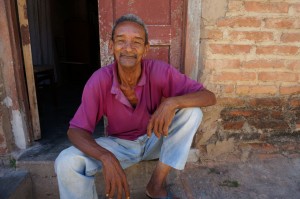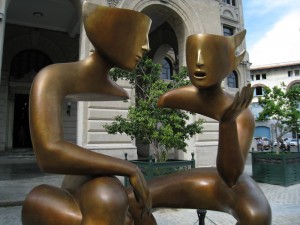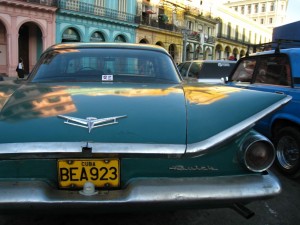These Aren’t the Terrorists We’re Looking For

Kids from the Santiago Ballet Company celebrating on Havana’s Malecon at midnight, after winning the 2015 dance competition. Photo by Barbara Wein, a member of our group.
April 17th, 2015 – The writing is on the wall, and it may be good news all around. A few days ago, Obama announced his intention to remove Cuba from the list of countries that support terrorism. There will have to be a 45-day waiting period and congressional approval; good luck with that. Already some Republicans are foaming at the mouth. What an astonishing bunch of ignorant, self-serving hypocrites. Many times during this trip, overwhelmed by the passion, creativity, humanity and kindness of the Cubans, we have shaken our heads at the surreal posture of the past half-century. It defies all reason.
By now, a week into our trip, I’ve spoken with more than a dozen Cubans from various walks of life. They share a tremendous wish to see the embargo lifted. They also share the sense that things won’t change terribly quickly—but that when it does, Cuba will decide who does business here and when. Some members of my Ethical Traveler delegation feel differently; there’s a fair amount of cynicism, and many of them believe that when the switch is flipped it will be like opening Pandora’s Box. That nothing will stop the tide of garish American businesses, iPhone billboards, cruise ships and University of Florida students on Spring break from pouring in.
I don’t know. Nobody knows. I hope they’re wrong. They  may be wrong in the short run but right in the long run, it’s impossible to say. Despite my well-deserved reputation for catastrophising I’m weirdly optimistic in this regard. For better and for worse, what Cuba has done with and since 1959 is truly unique in the world. When I see the propaganda billboards – La Puebla Es La Revolucion! – what strikes me the most is that Fidel’s revolution is still spoken about in the present tense. It is not something that happened; it’s a process. It’s an ongoing experiment.
may be wrong in the short run but right in the long run, it’s impossible to say. Despite my well-deserved reputation for catastrophising I’m weirdly optimistic in this regard. For better and for worse, what Cuba has done with and since 1959 is truly unique in the world. When I see the propaganda billboards – La Puebla Es La Revolucion! – what strikes me the most is that Fidel’s revolution is still spoken about in the present tense. It is not something that happened; it’s a process. It’s an ongoing experiment.
Maybe Cuba can remain unique. Maybe the island can find a way to combine prosperity and socialism, commercial temperance and artistic freedom, community building and individual incentive. It’s possible that something new can occur here. They lack the tribal self-interest of the failing Africans states, the naiveté and childish dependency of the Nepalese, the pious hypocrisy of the Middle Eastern kingdoms and the brutality and misogyny of Egypt and Pakistan. What they have now is sort of close to what the newly independent American colonies had in the late 1700s: a knowledge of how hard it was to got where they got, and a willingness to try something that hadn’t been tried before. And they have some advantages as well. There is not an entrenched classism, a slave economy or a war with indigenous people. Free health care and free education are guaranteed in their Constitution; though they may lack the “Life, liberty and the pursuit of happiness” abstraction.
 I love the Cubans and, Lord knows, I want them to succeed, but on their own terms. I don’t wish them to collapse under the weight of their own freedoms, saddled with everything that we have: a feeling of superiority, a sense of entitlement and consumerism to excess.
I love the Cubans and, Lord knows, I want them to succeed, but on their own terms. I don’t wish them to collapse under the weight of their own freedoms, saddled with everything that we have: a feeling of superiority, a sense of entitlement and consumerism to excess.
They don’t need it. Nobody does.





